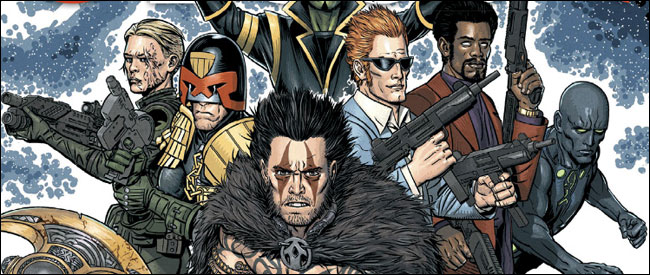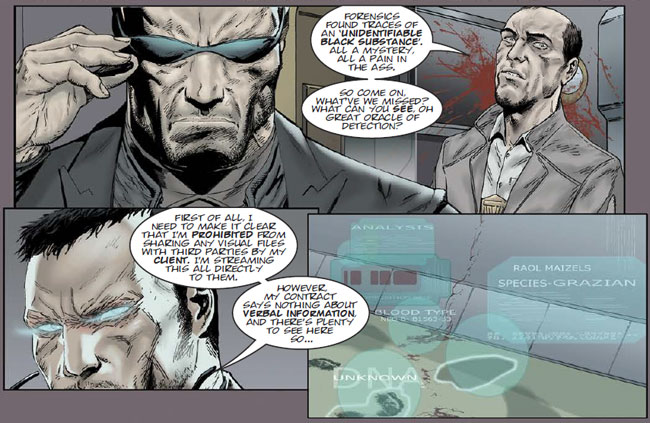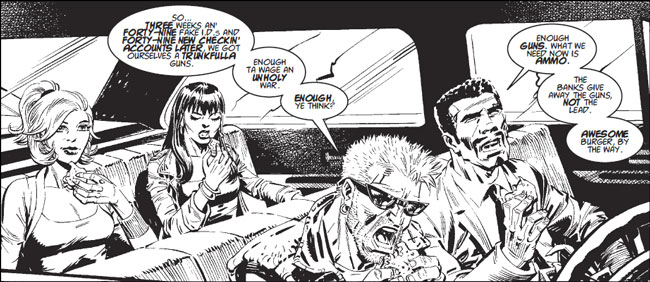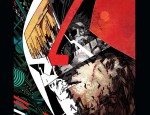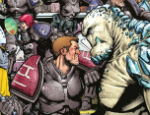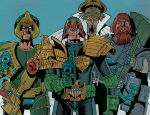With five new stories, the annual ‘jump-on’ issue of the British sci-fi anthology offers a solid mix of old and new series, all delivered in the comic’s familiar style.
It’d probably hate to be called venerable, but the British sci-fi anthology 2000 AD has been hitting the shelf every week since 1977. Over those decades the cream of British comics talent has made a name for itself in its pages, and generation after generation of earthlets has swept into the comic and – generally, after a few years – swept out again.
However, a little while ago Tharg The Mighty, the comic’s Betelguesian supremo, had a zarjaz idea: a jump-on (or jump-back-on) issue – sorry, prog – where new and lapsed readers alike could pick up a full slate of new stories, featuring both fresh and returning characters.
The jump-on prog is now a red letter day in the 2000AD calendar, so how well did this year’s edition dig its hooks into this lapsed Squaxx dek Thargo?
As ever, the prog starts with the comic’s most enduring and iconic character: Judge Dredd, in the first part of ‘Mega-City Confidential’ by definitive Dredd scribe John Wagner and veteran artist Colin MacNeil.
At the heart of the story is Erika Easterhouse, an “evaluator” in the Justice Department’s shadowy, beyond-top-secret Section 7. However, Erika has doubts about what she’s doing, and in a move calling to mind the Wikileaks revelations, she disappears with more than 2,000 files from the archive, prompting the intervention of MC1’s most senior lawman.
For anyone expecting the usual high-octane Mega-City action, this subdued episode might have come as a surprise. It highlights the richness and complexity that Dredd can offer, especially in the hands of a master like its co-creator, Wagner.
Meanwhile, the noirish, intimate art by MacNeil also suits the mood of the story perfectly, providing a stimulating change from the widescreen maximalism usually associated with the Big Meg.
Even in just six pages, this sows the seeds for what could be another classic storyline. Although he very much originated the 2000 AD archetype of “a bastard with a big gun”, things are seldom black and white in Dredd’s world; the character is often the villain as much as the hero.
The city’s most implacable Judge will stop at nothing to apprehend Erika and protect the interests of his department, and the appearance of Eric Blair Block (the real name of George Orwell) and the mention of a Judge Mugabe give an indication of the dark path the story might be taking.
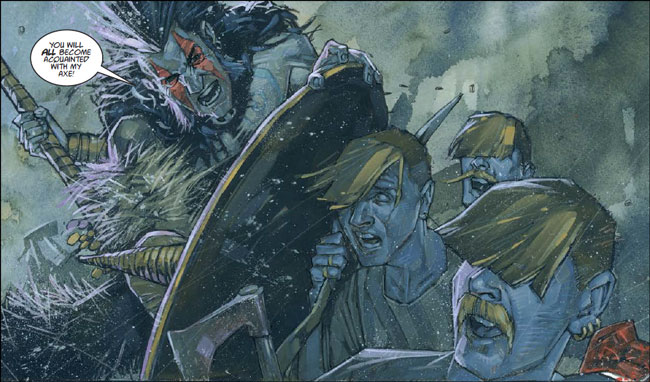
Next up is another old fave, Slaine (and note that I’m pronouncing it like that, not like that; it’s really very important).
The Goddess-bothering barbarian has been splitting skulls for decades now (you can even pick up a commemorative beanie to mark ’30 years of slaughter’), and the episode heading (‘The Brutania Chronicles – Book One; A Simple Killing – Part One’) gives an idea of the epic fantasy aspirations that go with the series.
The latest chronicle starts off straightforward enough: Slaine and his pal Gort are riding along when they come across the robbery of what turns out to be some of “the Goddess’s treasure”. A bit of po-faced banter and axe-swinging later, it turns out that a local tribal head had decreed the robbery wouldn’t be blasphemous because no-one believes in the Goddess any more – the sort of slight that Slaine takes very personally. So, off he trots to deliver the Simple Killing of the title (which, presumably, will be anything but).
Pat Mills has been generating this stuff for so long that he could probably do it in his sleep, and there’s nothing here to raise the heart rate much. However, the artwork of Simon Davis is suitably visceral, and he’s got a real penchant for portraiture; his work has calmed down a bit since the last time I saw it, in Ampney Crucis Investigates, where, as one reviewer memorably wrote, all of his characters looked like they’d just put a scalding chip into their mouth.
From something old to something new – Outlier by TC Eglington and Karl Richardson. This is a largely by-the-numbers futuristic detective/CSI sort of joint, starring the moody Carcer, a cop-turned-PI whose artificial eyes enable him to see beyond the visible spectrum and examine a murder scene in forensic detail.
Carcer is called in by an old colleague to help with a ‘locked-room’ murder (‘All a mystery. All a pain in the ass’), in which a billionaire has been force-fed some of his valuables and had his wrinkles ironed out with a statue.
As he gives the place the once-over, Carcer deduces that the murderer was one of the Hurde – the same bad-news alien race who blinded him as a child and shouldn’t be encroaching at this end of the galaxy.
The narrative strategy of this opening chapter is a little weird, giving the reader more info about what happened than the protagonists have, but it lays the ground for some interesting conflict, at both personal and diplomatic level. This is classic 2000 AD material, handled with clarity by both writer and artist.
Ever since I freed myself from the spell of Pulp Fiction, I’ve felt a degree of antipathy towards the notion of hitmen as the cool urban samurai of pop culture. I’m therefore at a bit of a loss to identify the enduring appeal of Sinister Dexter – another long-running series that clearly has its fan base.
Our two funt-buddies, together with a pair of charming young ladies, are apparently stuck on the colony planet of Generica as part of a witness protection programme. However (so the inside cover blurb informs us), they’re in danger of running into a ruthless old adversary, so by the time we pick up the story, they’re doing what they can to accumulate as much firepower as possible.
Despite being an admirer of the Stakhanovite work ethic of writer Dan Abnett, the opening part of ‘The Generican Dream’ still left me cold – particularly as it was the only one of the stories in the prog that felt like we were being dropped into the middle of an ongoing tale. The uncertain, fanzine-y artwork by ‘Smudge’ didn’t help much either.
The only glimmer of interest is the possibility of a satirical swipe at US gun culture; Generica has much of the atmosphere of the lawless, good ol’ boy American south about it.
The prog wraps up with another brand new series – Jaegir, by stalwart droids Gordon Rennie and Simon Coleby. This is another typically confident and well-executed piece of action-based sci-fi, but it’s also heavy on the typical conversational exposition that can characterise this sort of strip.
However, it also offers a more atypical protagonist. Set in the universe of the classic Rogue Trooper series, Jaegir‘s eponymous (female) lead is a Kapiten-Inspector in the Nordland State Security Police, tasked with rooting out and investigating war criminals – another pressing contemporary concern transposed into sci-fi.
Like any ‘internal affairs’ story, this offers the potential for a nice bit of conflict beyond the usual tale of life during wartime. Jaegir’s status as ‘the enemy within’ and hints of a troubled family background, as well as the scars – physical and psychological – of military service provide the potential to make her a compelling protagonist.
Prog 1874 certainly has more appeal than the last jumping-on issue I tried; while I can take or leave Slaine, and Sinister Dexter leaves me cold, Judge Dredd and the two new thrills have enough potential to warrant another look (even if there’s nothing very innovative about them in subject or execution).
One of 2000 AD‘s strengths down the years has been its satirical edge and readiness to pick up on contemporary issues and examine them through the prism of science fiction. While there’s not much in the way of biting satire in this issue, the potential for timely political commentary and intrigue in Dredd, Outlier and Jaegir demonstrate that – unlike a lot of thirty-somethings – 2000 AD has lost little of its energy or taste for political engagement. Splundig vur thrigg!
Various (W/A) • Rebellion, £2.45, March 26, 2014





